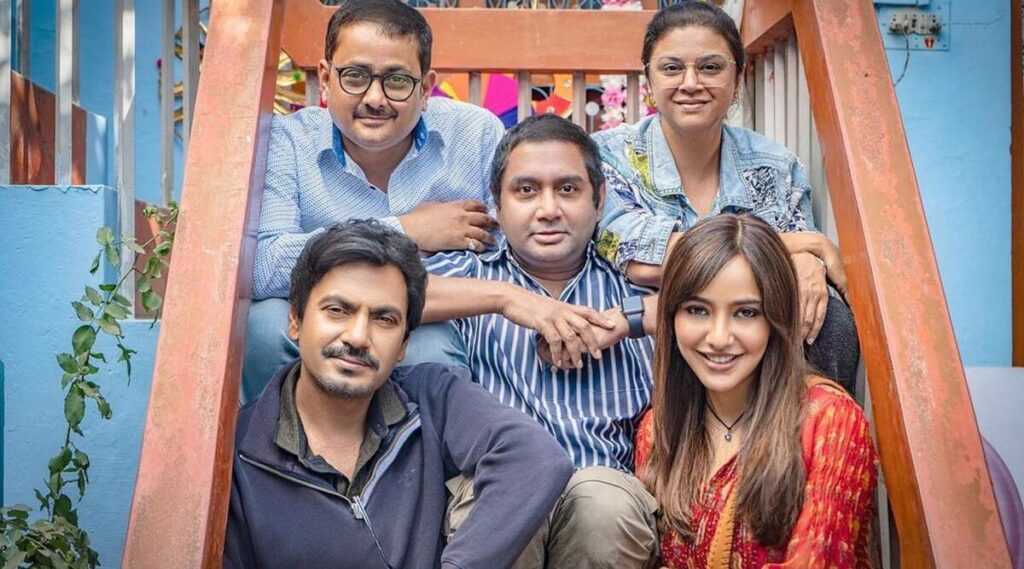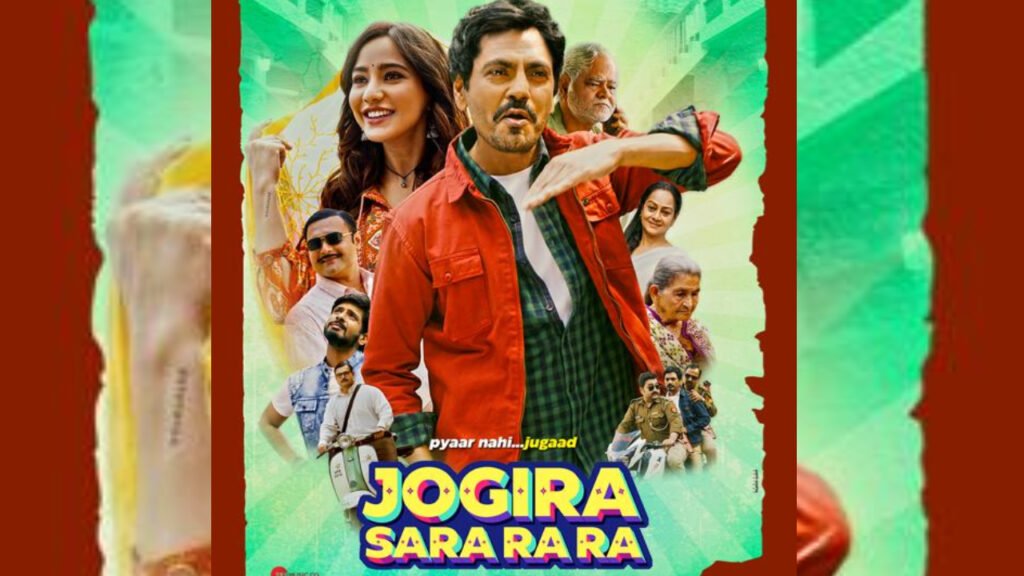Jogira Sara Ra Ra was released on 26th May and survived the box office with average reviews and half-empty theatres. The “regular Bollywood comedy” failed to give a voice to women even after its strained efforts, but successfully garnered a few chuckles. It is the story of a wedding planner Jogi (Nawazuddin Siddiqui) who rejects the idea of marriage and an independent small-town girl Dimple (Neha Sharma) who treats marriage as an excuse to elope.
The movie begins with Bollywood’s tiring depiction of an independent woman; a girl who drinks beyond her capacity, vomits, elopes, voices her needs, and smokes. The first meeting ends in disgust and hate, which of course changes through the course of the movie and culminates in a love marriage.
The movie begins with Bollywood’s tiring depiction of an independent woman; a girl who drinks beyond her capacity, vomits, elopes, voices her needs, and smokes. The first meeting ends in disgust and hate, which of course changes through the course of the movie and culminates in a love marriage.
The big screen beginning
The movie begins by pointing out the frivolity of marriage through the milieu of weddings. The setup and lyrics of the first song call shaadi (marriage) torture, belittling the complex relationship in society. And to complete the vicious circle, the girl is shown riding a ghodi (mare).

The dialogues keep insisting on how it is impossible to understand women while the female lead is shown vomiting and narrating her story. She demands money from the hero as if it is the sole responsibility of the man to financially support her.
A lampoonery of marriage
In a patriarchal society plagued with unsuccessful marriages, the movie tries to satirise the entire system while covertly blaming it all on women. Jogi reunites with his family in Lucknow where he lives with many sisters, mother, and bua (aunty).
Their introduction shows how they are always demanding and Jogi can never satisfy their needs. The names do not matter, only their relationship with the male characters. We never really come across their stories, they are sisters, mother, and aunty.
The next commentary on marriage comes soon after when coincidentally Jogi is hired by Dimple’s family to arrange the wedding. She meets him and narrates how she eloped with the man she loved after stealing money from her home. The boy cowered out and she lived lavishly on the money, only after exhausting it did she return home and now her parents are forcing her to get married. She requests Jogi to “disarrange her marriage” and he agrees, but only because he principally doesn’t believe in this institution.
The Lallu groom from Jogira Sara Ra Ra
Dimple’s groom is Lallu, it is his actual name in the movie. An overweight, spectacled, greasy hair employed man who looks dumb and carries his tiffin box on his shoulder. He is depicted to be floored and almost obliged by Dimple’s acceptance of his marriage proposal. He earns well, fights his family for no dowry, and tolerates the rude behaviour of his to-be wife.
The satirical depiction is a verbatim of patriarchy’s idea of the kind of guys who ultimately marry beautiful girls. He is the actual personification of every “government job guy gets the girl” joke. The movie’s idea of marriage is so grim, that the independent girl rarely voices her opinion except whenever she needs a bidi (smoke) or some alcohol. She keeps Lallu’s hopes alive by acting mysterious, flirting, or demanding he buys a sanitary napkin for her.
The satirical depiction is a verbatim of patriarchy’s idea of the kind of guys who ultimately marry beautiful girls. He is the actual personification of every “government job guy gets the girl” joke. The movie’s idea of marriage is so grim, that the independent girl rarely voices her opinion except whenever she needs a bidi (smoke) or some alcohol. She keeps Lallu’s hopes alive by acting mysterious, flirting, or demanding he buys a sanitary napkin for her.
Dowry, money and greed
The movie mocks societal evils like dowry and the in-laws’ greed. While Lallu doesn’t demand dowry but he assumes that Dimple being the only daughter, everything she owns would ultimately be his. Jogi’s family is shown as sweet, noble, and hospitable but they never refuse a chance to reject gifts from Dimple’s family.

Money is treated as a frivolous subject. Jogi even goes to the extent of claiming that a guy who doesn’t demand dowry is assumed to be defective. This movie and these limericks could have still worked some three decades ago but in this day and age, it is just a comment on how Bollywood hasn’t grown. If this is what commercial cinema means, then the fight for equal representation of women in India is far from realisation.
The sassy dadi in Jogira Sara Ra Ra
Bollywood loves making grandmothers its mouthpiece of modernity. The dadis (grandmothers) are shown having taboo conversations, enjoying alcohol, smoking, and keeping a close tab on their granddaughter’s relationships. Jogira Sara Ra Ra is no different, the role of grandmother is played by the veteran actress Farrukh Jaffar who passed away in 2021. She does justice to the loosely written character who is limited to her shenanigans.
She observes carefully, keeps a strict eye on the ongoings of the house, delivers crisp lines, and preaches how to perform well in the bedroom and keep the husband happy. She smokes carelessly, giggles with the younger generation, and eavesdrops.
Marriage: A deal
Jogi and Dimple strike a deal where they dismantle every fibre of the marriage institution. The deal churns a series of events that is chaotic, lined with some moments of laughter, and decorated with confusion that is mislabelled as love.

Through a realisation of this deal, many societal vices are brought to light. Dimple is kidnapped, as a joke, and a grave ransom amount is demanded. Dimple’s parents are made fools of, and a renowned criminal is revealed, who casually remarks how demonetisation has left them penniless. Police corruption is tackled as matter-of-fact and blood relations are taken for granted.
The portrayal of divorce, sex work and pregnancy
In a slight psychological dawn, we realise that Jogi might be afraid of marriage because his sister is divorced. His acceptance of love for Dimple takes the audience through a charade of mockery of divorce, sex work, and pregnancy.
All the important societal issues are touched with a pen that reeks of patriarchal privilege. Feminists have been fighting for decades to earn some screen time that discusses these issues but when Bollywood finally brings them to light, they are diluted. The mockery is imperfect and immature. Many reviewers claim the movie to be an everyday comedy, but it is a patriarchal revision of every cliché we had worked hard to reject over time.
Jogi loses his cool with his sister and blames her for her divorce, Dimple’s uncle frequents the brothel, and sex work is made light of. Sexually transmitted diseases become a reason to add some comedy to the script and what happens when Dimple wants to marry Jogi but he refuses? She claims she is pregnant with his child.

All the important societal issues are touched with a pen that reeks of patriarchal privilege. Feminists have been fighting for decades to earn some screen time that discusses these issues but when Bollywood finally brings them to light, they are diluted. The mockery is imperfect and immature. Many reviewers claim the movie to be an everyday comedy, but it is a patriarchal revision of every cliché we had worked hard to reject over time.
A patriarchal cliché
Jogira Sara Ra Ra is a title that celebrates the hero and his heroic demeanour. The movie tries hard to pack a score of social issues in a loosely written narrative. The script does no good to anybody, the representation of women is weak and biased and the men are burdened to carry it forward. The comedy is crafted at the expense of sexist and racial comments.
It is time that movies are written with more empathy and a clearer idea of how women must be represented to accord them a voice. The male gaze in Jogira Sara Ra Ra is so fixed that women dwindle in its effect. From item numbers to bidis hidden in blouses, the movie seems to be a scrapbook of everyday sexist jokes that claim to belittle women and build a stronger patriarchal society.
About the author(s)
Guni Vats is a research scholar at University of Lucknow. A passionate researcher and a curious soul, she aims to shift the 'center', one-word-at-a-time.






